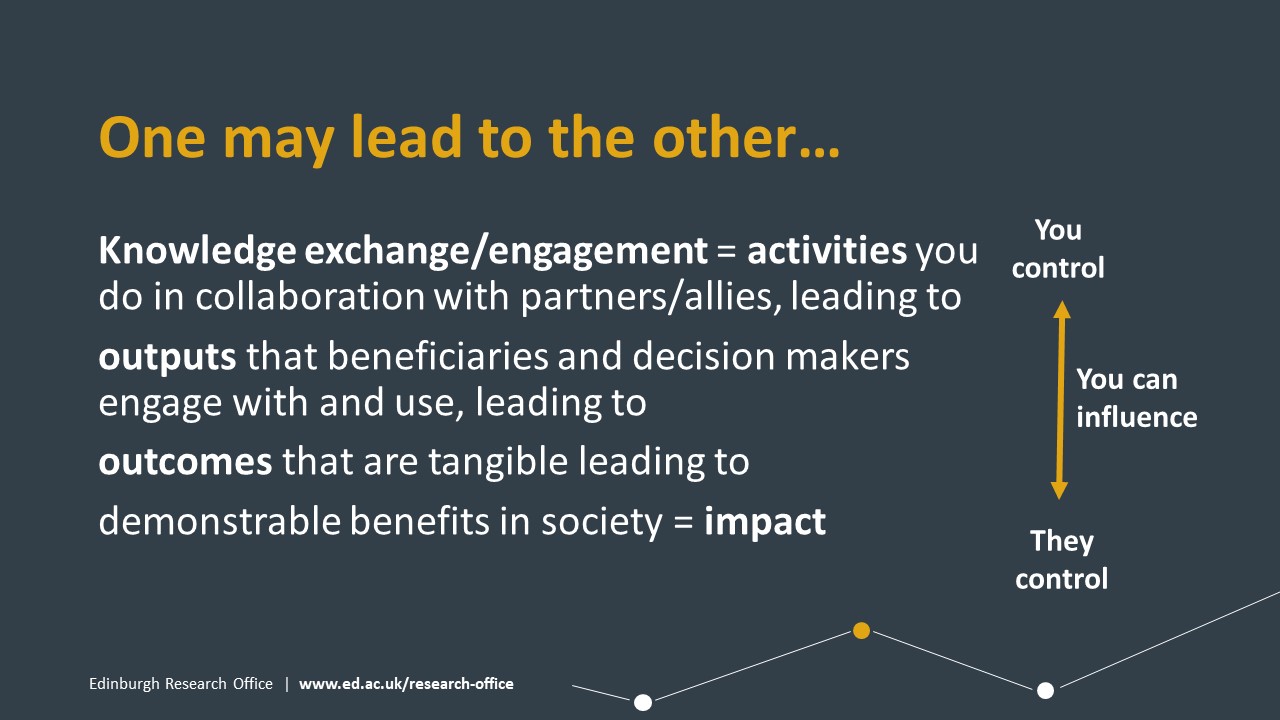Today, Dr Shonagh McEwan, Knowledge Exchange and Impact Advisor, CAHSS – shares learning from a recent event on ‘Impact Basics’. The event was aimed at researchers to help them find out more about ‘what is impact’ and how to develop impact from their research. This is the first of two blogs on this topic.
With so many jargon terms, and all this talk about ‘knowledge exchange’ and ‘impact’, many researchers find it beneficial to come along to our ‘impact basics’ sessions. We have run them over the last few years, and they have always proved popular. This time, we have recorded the session.
Watch the video here and gain some top insights from this blog and the one to follow.
What is impact?
When we talk about impact, we basically mean the difference your research can make beyond academia. This understanding of impact links to our vision as the University of Edinburgh. In our Strategy 2030, it states: Our graduates, and the knowledge we discover with our partners, make the world a better place. And this also links to the intrinsic motivations for research to make the world a better place. Hang on to these intrinsic motivations and this simple definition of impact as we turn to ‘what is the impact agenda’.
Going beyond ‘the impact agenda’
Demonstrating impact from research has become increasingly important, not least because there is greater pressure upon university research to demonstrate its public value.
The Research Excellence Framework (REF) started assessing impact in 2014, and increased the weighting of impact for REF 2021. In 2020, pathways to impact sessions were integrated into the main research proposal rather than being a separate section. This signalled that funders, e.g. UKRI, saw impact as integral to the overall research project, not as an add-on or afterthought.
Read our blog post from 2020: UKRI: Impact is core to the research application process.
These are the external drivers for impact, which often get referred to as ‘the impact agenda’. This is when the term ‘impact’ can take on specific definitions. What funders mean by ‘impact’ is the demonstrable contribution, value, positive effect, benefit or change as result of the research and knowledge exchange / engagement activities.
The exact definitions can vary depending on the funder and even different calls within the same funder. We would always advise you to look carefully at funder and scheme guidance to see what they mean by impact, and what they might also expect from knowledge exchange and engagement activities.
So the impact agenda is evolving and these external drivers are here to stay. But…
We should not engage with impact because of the impact agenda. We need to go beyond this, and remember the significance of those intrinsic motivations for our research to make the world a better place.
What’s ‘knowledge exchange’ and ‘engagement’?
In order to achieve this vision, we need to look at what audiences and stakeholders we want to engage with to make the world a better place. Knowledge exchange and engagement is about the bringing together of researchers, users of research in policy, practice, industry and wider communities to exchange ideas, evidence and expertise for mutual benefit.
It is important to distinguish knowledge exchange as a process, from impact as the result; whilst acknowledging that the two are connected and one may lead to another. This is shown in the following image:

You may have heard people talking about “doing impact” as opposed to “just knowledge exchange or engagement”. This is not a helpful way of looking at this. The point is that knowledge exchange and engagement should intend to lead to impact. But whether it actually has impact is beyond your control, as a lot of other factors come into play.
This is why you cannot just “do impact” even though you might hear people define it in that way – impact is what others do as a result of your research and engagement activities.
What next?
The terms ‘knowledge exchange, engagement and impact’ are being used in a university context. We are linking these jargon terms to the difference you can make with your research and your research evidence to make the world a better place.
And if you apply for research funding, or for funding to accelerate impact from your research, you need to plan knowledge exchange and engagement activities that you believe can be good pathways to the outcomes and impact you want to achieve. We’ll talk more about that in the next blog.
In the meantime you can:
Watch the full video on ‘impact basics’ (University of Edinburgh access staff only).
Access the slides from our Impact basics the event (University of Edinburgh staff access only).
Look out for our next blog on developing impact from your research.
Read our guide on how to build knowledge exchange and impact into your research (University of Edinburgh staff access only).
Explore all learning resources on our Engagement for Impact Hub (University of Edinburgh staff access only).
More from this author



